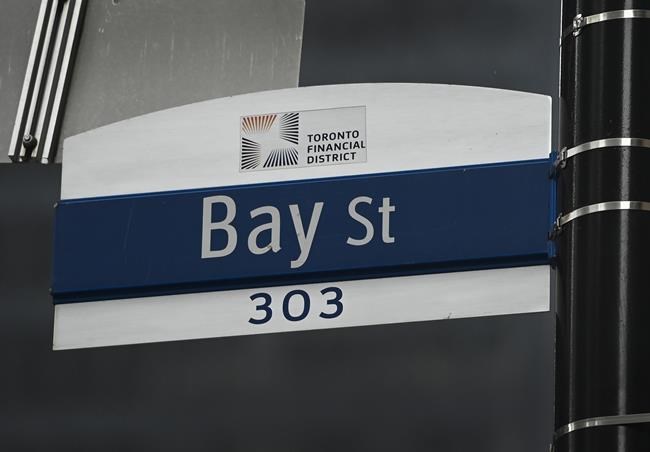TORONTO — A broad-based decline pushed Canada's main stock index lower midweek while a high inflation reading helped materials, with gold prices climbing to a five-month high.
"If you weren't in gold, you were probably negative today," said Michael Currie, vice-president and investment adviser at TD Wealth.
"That's just all attached to the inflation out there, which is still going even though we keep hearing it's transitory."
Rising gasoline and food prices sent inflation to a pandemic-era high in October, as the consumer price index posted its largest year-over-year gain in 18 years.
Statistics Canada said Wednesday the annual pace of inflation in October rose to 4.7 per cent, the fastest pace since February 2003. Excluding energy prices, the consumer price index would have been up 3.3 per cent last month compared with October 2020.
The U.S. reported last week that inflation rose to a more than 30-year high of 6.9 per cent in October.
The S&P/TSX composite index closed down 64.14 points to 21,653.02, a day after setting an intraday record.
In New York, the Dow Jones industrial average was down 211.17 points at 35,931.05. The S&P 500 index was down 12.23 points at 4,688.67, while the Nasdaq composite was down 52.29 points at 15,921.57.
The U.S. markets fell even though retail giants Target and Lowe's posted strong quarterly results and gave commentary forecast strong holiday results to come. Target's shares came under pressure, however, after it said margins will be impacted by its decision not to pass along rising costs to consumers.
In Canada, consumer staples slipped nearly 0.8 per cent after shares of grocery chains Metro Inc. and Loblaw Companies Ltd. fell as they struggle with rising costs and supply chain issues.
"They're very good defensive companies when things are bad and when things are reopening they're a little less favourable," said Currie.
Materials and utilities were the only sectors in positive territory on the TSX. The base metals, forestry and fertilizer sector fell 0.8 per cent as gold, a hedge against inflation, rose by a similar amount.
The December gold contract was up US$16.10 at US$1,870.20 an ounce, the highest level since June. The December copper contract was down 8.6 cents at nearly US$4.27 a pound.
The remaining nine major sectors on the TSX were down, led by health care, industrials, real estate and energy.
Health care lost three per cent as shares of cannabis producers lagged. Aurora Cannabis Inc. fell 5.1 per cent while Canopy Growth Corp. was down five per cent.
Energy dropped as crude oil prices fell to a six-week low while the Canadian dollar traded for 79.40 cents US compared with 79.68 cents US on Tuesday.
The January crude oil contract was down US$2.19 at US$77.55 per barrel and the December natural gas contract was down 36.1 cents at US$4.82 per mmBTU.
PrairieSky Royalty Ltd. was down 3.1 per cent while Vermilion Energy Inc. was 2.6 per cent lower on the day.
Crude fell on reports that U.S. President Joe Biden asked Chinese president Xi Jinping to raise output after being rebuffed by OPEC, said Currie. There is also speculation that Biden may tap into the country's strategic petroleum reserves.
"But even the people who are kind of bearish are saying even if they do release their reserves, it's going to be a very temporary thing. They can't keep it up forever.".
This report by The Canadian Press was first published Nov. 17, 2021.
Companies in this story: (TSX:PSK, TSX:VET, TSX:ACB, TSX:WEED, TSX:L, TSX:MRU, TSX:GSPTSE, TSX:CADUSD=X)
Ross Marowits, The Canadian Press



